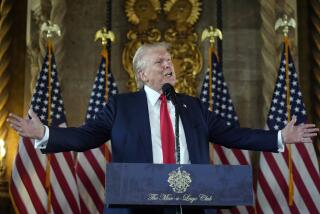Fired U.S. attorney tells of a lunch with politics on the menu
WASHINGTON — Weeks before the 2006 midterm election, then-New Mexico U.S. Atty. David C. Iglesias was invited to dine with a well-connected Republican lawyer in Albuquerque who had been after him for years to prosecute allegations of voter fraud.
“I had a bad feeling about that lunch,” said Iglesias, describing his meeting at Pappadeaux Seafood Kitchen with Patrick Rogers, a lawyer who provided occasional counsel to the New Mexico Republican Party.
When the voter fraud issue came up, Iglesias said, he explained to Rogers that in reviewing more than 100 complaints, he hadn’t found any solid enough to justify criminal charges.
Iglesias recounted the episode in an interview with The Times after meeting behind closed doors with federal investigators this week to provide new details of the events leading up to his termination as U.S. attorney. He said he now believed he was targeted because he was seen as slow to bring criminal charges that would have helped GOP election prospects.
Federal investigators are examining whether electoral considerations -- such as a broader Republican initiative to enforce anti-fraud rules and cull questionable voters from rolls nationwide -- played a part in the termination of Iglesias and other U.S. attorneys last year.
The Iglesias case has attracted special attention because the Bush administration has had difficulty defending his dismissal as being nonpolitical, especially after Iglesias revealed that two Republican members of Congress had called him before November’s election to ask about a corruption case against New Mexico Democrats.
Iglesias’ account of the lunch meeting with Rogers, not previously reported, raises new questions about political pressures applied to U.S. attorneys related to voter fraud and other matters.
Rogers confirmed the lunch meeting but disputed parts of Iglesias’ account, saying Iglesias had been changing his story “depending on what he needs to do to keep the story alive, get media attention and write another chapter of his book.”
Discussion of voter fraud
Iglesias has told reporters and investigators that he is speaking out because his reputation has been assaulted and because political considerations were pushed improperly into the once-sacrosanct area of prosecutorial discretion.
“I believe the primary reason for my forced resignation is that I was not engaged in filing criminal complaints ... in advance of the ’06 election,” Iglesias said in an interview after his three-hour meeting with the Office of Special Counsel.
Justice Department spokesman Brian Roehrkasse said, “The department did not and would not ask for the resignation of any individual, including Mr. Iglesias, in order to interfere with or influence a particular prosecution for partisan political gain.”
Although most of the seven other U.S. attorneys fired last year have not complained as aggressively, the dismissals have created a cascade of embarrassments for the department and Atty. Gen. Alberto R. Gonzales, who faces a “no confidence” vote in the Senate next week.
This week, another fired U.S. attorney who has said he felt pressure on voter fraud cases, John McKay of Seattle, said he thought interference with Iglesias and other prosecutors amounted to “possible obstruction of justice.” He predicted that a criminal inquiry would be launched. He said he felt pressure to bring voter fraud charges in his district after a 129-vote margin put a Democratic governor into office in Washington.
“Suffice it to say that we thoroughly investigated [the election] at every appropriate turn. My job is to look at the evidence, and frankly, there wasn’t any evidence of a crime,” McKay said.
Iglesias reached a similar conclusion after reviewing voter fraud allegations in New Mexico.
Rogers said Iglesias had adopted the Democrats’ view of election fraud, dismissing a serious problem as the imaginings of feverish partisans.
In fact, both major parties work assiduously to interpret election laws in their favor, particularly in battleground states where elections can be decided by thin margins.
Rogers, Iglesias recalled, had pressed him in 2004 and then again just before the 2006 election to push for voter fraud convictions in the state. Iglesias said he was so concerned about the propriety of the preelection get-together with Rogers that he asked a colleague from the office to join him as a witness.
Rogers, reached by telephone in Albuquerque, recalled a brief discussion of voter fraud at the lunch, but he challenged much of Iglesias’ account.
Rogers said the primary purpose of the gathering was to discuss the U.S. attorney’s failure to move on corruption cases, not voter fraud. Rogers also said that it was he who invited the other employee of the office to attend and that he was presenting them with concerns of others in law enforcement, including concerns raised in a newspaper article that described how the FBI had finished its work on a public corruption matter and turned it over to the U.S. attorney.
Rogers acknowledged he had challenged Iglesias in the past to review instances of alleged voter fraud and said he was shocked that Iglesias launched a task force on the broad issue rather than pursuing specific cases.
‘Absentee landlord’
Unbeknownst to Iglesias, a few months before that lunch, Rogers and another Republican attorney from New Mexico, Mickey Barnett, had complained about Iglesias at the Justice Department in Washington. The session was arranged with the assistance of the department’s then-White House liaison, Monica M. Goodling, and an aide to White House political strategist Karl Rove, according to e-mails released recently by congressional investigators.
One of those they met with was Matthew Friedrich, a senior counselor to Gonzales. Friedrich would meet again with Rogers and Barnett in New Mexico, where, he told congressional investigators, the pair complained about Iglesias. They made it clear “that they did not want him to be the U.S. attorney.... They mentioned that they had communicated that with Sen. Domenici, and they also mentioned Karl Rove,” Friedrich said, according to a transcript provided by congressional investigators. Pete V. Domenici is a Republican U.S. senator in New Mexico.
Iglesias has said that he believes “all roads lead to Rove” in explaining the dismissals and that he is counting on the Office of Special Counsel to find the truth.
That obscure office is charged with enforcing the Hatch Act, which forbids the use of federal resources for electoral purposes, and another law protecting military service members from discrimination. Iglesias, who is in the Naval Reserve, says he believes his termination violated the Hatch Act and the Uniformed Services Employment and Reemployment Rights Act.
“I recognize the inherent power of the president to remove his people -- but he can’t do it for just any reason,” Iglesias said in the interview. “There are some reasons you can’t remove someone.” Those reasons include an unwillingness to cooperate with a plan to help one political party over another, he said.
In talking with investigators, Iglesias circled back to Goodling’s handwritten notes, obtained last month by the House and Senate Judiciary committees, which included a list of reasons for the eight firings.
Next to Iglesias’ name, she wrote: “Domenici says he doesn’t move cases” and later the words “absentee landlord.” Domenici has acknowledged calling Iglesias last fall but says he applied no pressure. He had been upset with what he perceived as Iglesias’ inaction, and he also called Gonzales, Rove and President Bush.
Goodling’s “absentee landlord” complaint, repeated later by others in the department, galls Iglesias. The former prosecutor says his only absence besides routine vacation was for required service -- up to 45 days a year -- in the Naval Reserve.
“It was absolutely irritating to have a 33-year-old noncareer Justice Department official say these things and not do her due diligence to check them out,” he said.
He said he believed it was a breach of the law to get rid of a prosecutor because he was completing required military service.
When the department first asked him to resign, Iglesias says he was “content to leave quietly.” But the 49-year-old, who was a model for the character played by Tom Cruise in the movie “A Few Good Men,” said he had become increasingly irate as he learned about the pressures that might have led to his forced resignation and as he heard the public reasons offered to explain his departure.
Despite Justice Department denials, he insists: “There was an illegitimate basis for their effort to remove me. It was political.”
Times staff writer Richard B. Schmitt contributed to this report.
More to Read
Sign up for Essential California
The most important California stories and recommendations in your inbox every morning.
You may occasionally receive promotional content from the Los Angeles Times.










